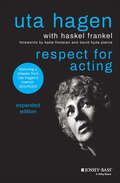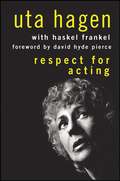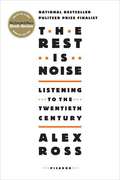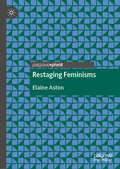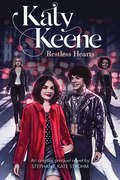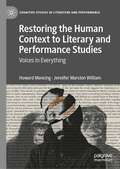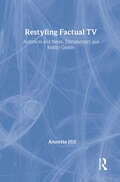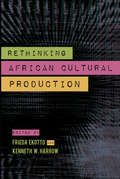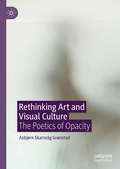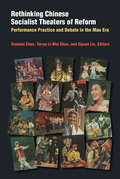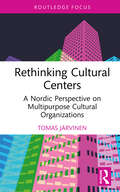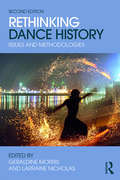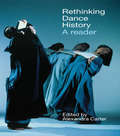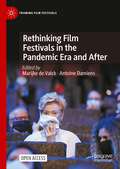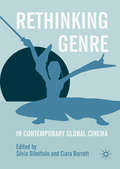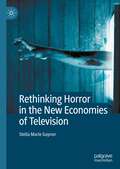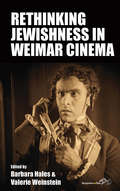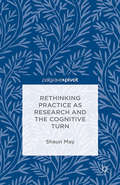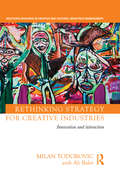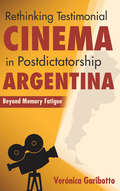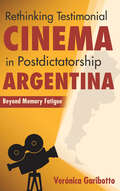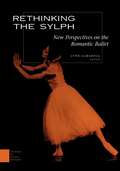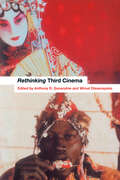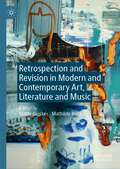- Table View
- List View
Respect for Acting: Expanded Version
by Uta HagenThe classic book on acting, in an attractive updated edition Since its original publication in 1973, Uta Hagen's Respect for Acting has remained a durable classic and a must-read for all students of acting. As an acting instructor at the Herbert Berghof Studio, Hagen helped to develop the talents of world-class actors like Robert DeNiro, Matthew Broderick, Gene Wilder, Amanda Peet, Austin Pendleton, Whoopi Goldberg, and more. In this book, Hagen offers an indispensable account of the techniques that professionals use to elevate their acting to an art form. This updated edition illuminates Hagen's original text with a new foreword written by Katie Finneran, retaining the David Hyde Pierce foreword, along with added background on HB Studio—one of the original New York performing arts training and practice spaces—and an excerpt from Hagen's autobiography SOURCES. In working through this book, actors will learn physical, verbal, and emotional practice that empower them to connect their own self-concept to the characters they play. Specific, detailed exercises help actors learn to address a range of problems actors face, like maintaining immediacy and relevance, and developing the dimensions of a role over a long performance run. Respect for Acting is a book for actors and audiences who understand the need for truth in the creative process. Discover the acting book that has shaped professional theater performances for decades Learn the history and background of Herbert Berghof Studio, one of New York's foremost acting schools Practice the craft of acting with concrete exercises and instruction on technique Delve into the deep questions that arise when actors truly inhabit the lives of their characters Actors at all levels of their craft will love this stunning updated version of the essential Respect for Acting.
Respect for Acting
by Uta Hagen Haskel FrankelBased on her teachings, this is an account of Uta Hagen's own struggle with the techniques of acting.
The Rest Is Noise: Listening to the Twentieth Century
by Alexander RossRoss (music critic for The New Yorker) tells the story of 20th century classical composition, which for him is an "untamed art, and unassimilated underground." While composers from Richard Strauss to John Adams lie at the heart of the narrative, Ross also places them within a social and political world, describing the politicians, dictators, corporate officers, art patrons, intellectuals, and critics who have attempted to adjudicate and control musical expression and the social upheavals that impacted the lives of composers and the music they produced. He also goes beyond the genre confines of classical to discuss connections to such artists as Duke Ellington, Miles Davis, the Beatles, and the Velvet Underground.
Restaging Feminisms
by Elaine AstonRestaging Feminisms offers a re-encounter with the tripartite modelling of liberal, radical, and socialist feminisms foundational to establishing feminist approaches to theatre. This lucid account of past-present connections to the staging of feminism assesses the legacies and renewals of all three feminist dynamics as they intersect with austerity Britain, the Weinstein watershed, and the #MeToo movement. Feminist politics, concepts, and the role of affect in the making of political attachments inform an approach that values understanding feminism’s past as critical to reanimating and restaging socially progressive, feminist futures. The volume includes case studies of productions staged between 2016 and 2019: Caryl Churchill’s Escaped Alone; David Greig’s version of The Suppliant Women; Morgan Lloyd Malcolm’s Emilia; Nina Raine’s Consent; Townsend Theatre’s We Are The Lions Mr Manager; and Laura Wade’s Home, I’m Darling. From an author with a pioneering and thirty-year-long commitment to the study of feminism and British theatre, Restaging Feminisms is for an intergenerational feminist-theatre readership: for those who are discovering relations between feminism and theatre for the first time and those re-encountering the feminist dynamics and their renewed resonance on the contemporary British stage.
Restless Hearts (Katy Keene, Novel #1)
by Stephanie Kate StrohmBefore Katy, Jorge, Pepper, and Josie were best friends, they were just four teenagers following their dreams. Katy Keene is struggling to get by after her mom's death. That is, until she gets a call from her old friend Veronica Lodge with the opportunity of a lifetime. Uptown, Jorge Lopez is trying to break into Broadway. There's an open call coming up that could make his dreams a reality-but landing the role might mean pretending he's someone else.According to the tabloids, Pepper Smith is one of the most notorious socialites in the city. Good thing they don't know the truth about her past.And Josie McCoy left Riverdale to tour the country and pursue her dreams. But if she wants to become a star, it might be time for a change. . .Told from alternating points of view, this Katy Keene prequel novel is an original story not seen on the show!
Restoration Plays and Players
by David RobertsIntroducing readers to the key texts, theatrical practice and context of late seventeenth-century drama, David Roberts combines literary and theatrical approaches to show how Restoration plays were written, performed, received and printed. Structured according to the 'life cycle' of the dramatic text, this book reproduces extracts from twenty-four of the most influential Restoration plays to provide readers with a comprehensive and colourful introduction to the period's drama. Roberts encourages readers to look beyond a limited canon of established plays and practice, and to see how Restoration Drama has been revived and adapted on the modern stage. Restoration Plays and Players is of great interest to undergraduate and non-specialist readers of seventeenth-century drama, Restoration literature and theatre studies.
Restoring the Human Context to Literary and Performance Studies: Voices in Everything (Cognitive Studies in Literature and Performance)
by Howard Mancing Jennifer Marston WilliamRestoring the Human Context to Literary and Performance Studies argues that much of contemporary literary theory is still predicated, at least implicitly, on outdated linguistic and psychological models such as post-structuralism, psychoanalysis, and behaviorism, which significantly contradict current dominant scientific views. By contrast, this monograph promotes an alternative paradigm for literary studies, namely Contextualism, and in so doing highlights the similarities and differences among the sometimes-conflicting contemporary cognitive approaches to literature and performance, arguing not in favor of one over the other but for Contextualism as their common ground.
Restyling Factual TV: Audiences and News, Documentary and Reality Genres
by Annette HillAddressing the wide range of programmes and formats from news, to documentary, to popular factual genres, Annette Hill’s new book examines the ways viewers navigate their way through a busy, noisy and constantly changing factual television environment. Restyling Factual TV addresses the wide range of programmes that fall within the category of 'factuality', from politics, to natural history, to reality entertainment. Based on research with audiences of factual TV, primarily in Sweden and the UK, but with reference to other countries such as the US, this book tackles issues such as legitimacy, ethics and value in contemporary news and current affairs, documentary and reality programming. Drawing on the ethics of truth-telling and notions of quality, this wide-ranging, authoritative book expands the debate on popular factual entertainment and will be a welcome addition to the current literature.
Rethinking African Cultural Production
by Frieda Ekotto Kenneth W. HarrowFrieda Ekotto, Kenneth W. Harrow, and an international group of scholars set forth new understandings of the conditions of contemporary African cultural production in this forward-looking volume. Arguing that it is impossible to understand African cultural productions without knowledge of the structures of production, distribution, and reception that surround them, the essays grapple with the shifting notion of what "African" means when many African authors and filmmakers no longer live or work in Africa. While the arts continue to flourish in Africa, addressing questions about marginalization, what is center and what periphery, what traditional or conservative, and what progressive or modern requires an expansive view of creative production.
Rethinking Art and Visual Culture: The Poetics of Opacity
by Asbjørn Skarsvåg GrønstadThis is the first book to offer a systematic account of the concept of opacity in the aesthetic field. Engaging with works by Ernie Gehr, John Akomfrah, Matt Saunders, David Lynch, Trevor Paglen, Zach Blas, and Low, the study considers the cultural, epistemological, and ethical values of images and sounds that are fuzzy, indeterminate, distorted, degraded, or otherwise indistinct. Rethinking Art and Visual Culture shows how opaque forms of art address problems of mediation, knowledge, and information. It also intervenes in current debates about new systems of visibility and surveillance by explaining how indefinite art provides a critique of the positivist drive behind these regimes. A timely contribution to media theory, cinema studies, American studies, and aesthetics, the book presents a novel and extensive analysis of the politics of transparency.
Rethinking Chinese Socialist Theaters of Reform: Performance Practice and Debate in the Mao Era
The profound political, economic, and social changes in China in the second half of the twentieth century have produced a wealth of scholarship; less studied however is how cultural events, and theater reforms in particular, contributed to the dynamic landscape of contemporary Chinese society. Rethinking Chinese Socialist Theaters of Reform fills this gap by investigating the theories and practice of socialist theater and their effects on a diverse range of genres, including Western-style spoken drama, Chinese folk opera, dance drama, Shanghai opera, Beijing opera, and rural theater. Focusing on the 1950s and ’60s, when theater art occupied a prominent political and cultural role in Maoist China, this book examines the efforts to remake theater in a socialist image. It explores the unique dynamics between official discourse, local politics, performance practice, and audience reception that emerged under the pressures of highly politicized cultural reform as well as the off-stage, lived impact of rapid policy change on individuals and troupes obscured by the public record. This multidisciplinary collection by leading scholars covers a wide range of perspectives, geographical locations, specific research methods, genres of performance, and individual knowledge and experience. The richly diverse approach leads readers through a nuanced and complex cultural landscape as it contributes significantly to our understanding of a crucial period in the development of modern Chinese theater and performance.
Rethinking Cultural Centers: A Nordic Perspective on Multipurpose Cultural Organizations (Routledge Focus on the Global Creative Economy)
by Tomas JärvinenWhat are cultural centers for? This book offers a unique and dynamic guide to managing these organizations, and the challenge of reconciling cultural aims with business success. Drawing on research and practice, it provides case- based insights into common managerial problems and their solutions. Although international research demonstrates that culture has positive economic impact and many cultural institutions are multimillion dollar institutions, there has been little research on how cultural centers are managed to combine cultural and economic impact. Due to the diversity of their missions and purpose, cultural centers in Europe often struggle to find business success. By drawing on recent cases from Finland and Sweden, and focusing on the challenges that face both managers and organizations, this book explores the incentives that underpin the foundation of cultural centers, and what is needed to make them a success. By defining the complex challenges that face cultural centers, this book enables managers to move beyond administrating an organization to becoming cultural entrepreneurs, turning good ideas into good business. In this underresearched area, this book will be essential reading for researchers, policy makers and managers working in cultural centers and museum management.
Rethinking Dance History: Issues and Methodologies
by Geraldine Morris Larraine NicholasThe need to ‘rethink’ and question the nature of dance history has not diminished since the first edition of Rethinking Dance History. This revised second edition addresses the needs of an ever-evolving field, with new contributions considering the role of digital media in dance practice; the expansion of performance philosophy; and the increasing importance of practice-as-research. A two-part structure divides the book’s contributions into: • Why Dance History? – the ideas, issues and key conversations that underpin any study of the history of theatrical dance. • Researching and Writing – discussions of the methodologies and approaches behind any successful research in this area. Everyone involved with dance creates and carries with them a history, and this volume explores the ways in which these histories might be used in performance-making – from memories which establish identity to re-invention or preservation through shared and personal heritages. Considering the potential significance of studying dance history for scholars, philosophers, choreographers, dancers and students alike, Rethinking Dance History is an essential starting point for anyone intrigued by the rich history and many directions of dance.
Rethinking Dance History: A Reader
by Larraine Nicholas Geraldine MorrisBy taking a fresh approach to the study of history in general, Alexandra Carter's Rethinking Dance History offers new perspectives on important periods in dance history and seeks to address some of the gaps and silences left within that history. Encompassing ballet, South Asian, modern dance forms and much more, this book provides exciting new research on topics as diverse as: *the Victorian music hall *film musicals and popular music videos *the impact of Neoclassical fashion on ballet *women's influence on early modern dance *methods of dance reconstruction. Featuring work by some of the major voices in dance writing and discourse, this unique anthology will prove invaluable for both scholars and practitioners, and a source of interest for anyone who is fascinated by dance's rich and multi-layered history.
Rethinking Film Festivals in the Pandemic Era and After (Framing Film Festivals)
by Marijke De Valck Antoine DamiensThis is an open access book. This edited collection aims to document the effects of Covid-19 on film festivals and to theorize film festivals in the age of social distancing. To some extent, this crisis begs us to consider what happens when festivals can’t happen; while films have found new (temporary) channels of distribution (most often in the forms of digital releases), the festival format appears particularly vulnerable in pandemic times. Imperfect measures, such as the move to a digital format, cannot recapture the communal experience at the very core of festivals. Given the global nature of the pandemic and the diversity of the festival phenomenon, this book features a wide range of case studies and analytical frameworks. With contributors including established scholars and frontline festival workers, the book is conceived as both a theoretical endeavour and a practical exploration of festival organizing in pandemic times.
Rethinking Genre in Contemporary Global Cinema
by Silvia Dibeltulo Ciara BarrettRethinking Genre in Contemporary Global Cinema offers a unique, wide-ranging exploration of the intersection between traditional modes of film production and new, transitional/transnational approaches to film genre and related discourses in a contemporary, global context. This volume’s content—the films, genres, and movements explored, as well as methodologies used in their analysis—is diverse and, crucially, up-to-date with contemporary film-making practice and theory. Significantly, the collection extends existing scholarly discourse on film genre beyond its historical bias towards a predominant focus on Hollywood cinema, on the one hand, and a tendency to treat “other” national cinemas in isolation and/or as distinct systems of production, on the other. In view of the ever-increasing globalisation and transnational mediation of film texts and screen media and culture worldwide, the book recognises the need for film genre studies and film genre criticism to cast a broader, indeed global, scope. The collection thus rethinks genre cinema as a transitional, cross-cultural, and increasingly transnational, global paradigm of film-making in diverse contexts.
Rethinking Horror in the New Economies of Television
by Stella Marie GaynorThis book explores the cycle of horror on US television in the decade following the launch of The Walking Dead, considering the horror genre from an industrial perspective. Examining TV horror through rich industrial and textual analysis, this book reveals the strategies and ambitions of cable and network channels, as well as Netflix and Shudder, with regards to horror serialization. Selected case studies; including American Horror Story, The Haunting of Hill House, Creepshow, Ash vs Evil Dead, and Hannibal; explore horror drama and the utilization of genre, cult and classic horror texts, as well as the exploitation of fan practice, in the changing economic landscape of contemporary US television. In the first detailed exploration of graphic horror special effects as a marker of technical excellence, and how these skills are used for the promotion of TV horror drama, Gaynor makes the case that horror has become a cornerstone of US television.
Rethinking Jewishness in Weimar Cinema (Film Europa #24)
by Barbara Hales and Valerie WeinsteinThe burgeoning film industry in the Weimar Republic was, among other things, a major site of German-Jewish experience, one that provided a sphere for Jewish “outsiders” to shape mainstream culture. The chapters collected in this volume deploy new historical, theoretical, and methodological approaches to understanding the significant involvement of German Jews in Weimar cinema. Reflecting upon different conceptions of Jewishness – as religion, ethnicity, social role, cultural code, or text – these studies offer a wide-ranging exploration of an often overlooked aspect of German film history.
Rethinking Practice as Research and the Cognitive Turn
by S. MayThe last 15 years has seen an explosion of studies that use cognitive science to understand theatre, whilst at the same time theatre-makers are using their artistic practice to address research question. This book looks at the current discourse around these emerging fields.
Rethinking Strategy for Creative Industries: Innovation and Interaction (Routledge Research in Creative and Cultural Industries Management)
by Milan Todorovic with Ali BakirCreative Industry practices are increasingly manifested through hybrid models and methods and emerging sub-sectors. With ever finer dividing lines between form and content, product and service, participation and consumption, the distinctions between sectors are increasingly blurred, while new, convergent models emerge. Reflecting this fluid context, this book provides a new perspective on strategy in the Creative Industries. Based on extensive original research and live empirical data derived from case studies, interviews, and observations with creative managers, it reveals strategic decision-making by analysing business manoeuvres and stages of innovation in the Creative Industries. Through analysing the interactive features of aesthetically driven information assets, and how new user/consumer cultures are applied, it uncovers the principles that are transforming strategy in the Creative Industries. This innovative volume will be of significant interest to scholars, advanced students and practitioners in the Creative Industries as well as well as industry consultancies and practitioners.
Rethinking Testimonial Cinema in Postdictatorship Argentina: Beyond Memory Fatigue (New Directions in National Cinemas)
by Verónica GaribottoFor roughly two decades after the collapse of the military regime in 1983, testimonial narrative was viewed and received as a privileged genre in Argentina. Today, however, academics and public intellectuals are experiencing "memory fatigue," a backlash against the concepts of memory and trauma, just as memory and testimonial films have reached the center of Argentinian public discourse. In Rethinking Testimonial Cinema in Postdictatorship Argentina, Verónica Garibotto looks at the causes for this reticence and argues that, rather than discarding memory texts for their repetitive excess, it is necessary to acknowledge them and their exhaustion as discourses of the present. By critically examining how trauma theory and subaltern studies have previously been applied to testimonial cinema, Garibotto rereads Argentinian films produced since 1983 and calls for an alternate interpretive framework at the intersection of semiotics, theories of affect, scholarship on hegemony, and the ideological uses of documentary and fiction. She argues that recurrent concepts—such as trauma, mourning, memory, and subalternity—miss how testimonial films have changed over time, shifting from subaltern narratives to official, hegemonic, and iconic accounts. Her work highlights the urgent need to continue to study these types of narratives, particularly at a time when military dictatorships have become entrenched in Latin America and memory narratives proliferate worldwide. Although Argentina is Garibotto’s focus, her theory can be adapted to other contexts in which narratives about recent political conflicts have shifted from alternative versions of history to official, hegemonic accounts—such as in Spanish, Chilean, Uruguayan, Brazilian, South African, and Holocaust testimonies. Garibotto’s study of testimonial cinema moves us to pursue a broader ideological analysis of the links between film and historical representation.
Rethinking Testimonial Cinema in Postdictatorship Argentina: Beyond Memory Fatigue (New Directions in National Cinemas)
by Verónica GaribottoFor roughly two decades after the collapse of the military regime in 1983, testimonial narrative was viewed and received as a privileged genre in Argentina. Today, however, academics and public intellectuals are experiencing "memory fatigue," a backlash against the concepts of memory and trauma, just as memory and testimonial films have reached the center of Argentinian public discourse. In Rethinking Testimonial Cinema in Postdictatorship Argentina, Verónica Garibotto looks at the causes for this reticence and argues that, rather than discarding memory texts for their repetitive excess, it is necessary to acknowledge them and their exhaustion as discourses of the present.By critically examining how trauma theory and subaltern studies have previously been applied to testimonial cinema, Garibotto rereads Argentinian films produced since 1983 and calls for an alternate interpretive framework at the intersection of semiotics, theories of affect, scholarship on hegemony, and the ideological uses of documentary and fiction. She argues that recurrent concepts—such as trauma, mourning, memory, and subalternity—miss how testimonial films have changed over time, shifting from subaltern narratives to official, hegemonic, and iconic accounts. Her work highlights the urgent need to continue to study these types of narratives, particularly at a time when military dictatorships have become entrenched in Latin America and memory narratives proliferate worldwide. Although Argentina is Garibotto's focus, her theory can be adapted to other contexts in which narratives about recent political conflicts have shifted from alternative versions of history to official, hegemonic accounts—such as in Spanish, Chilean, Uruguayan, Brazilian, South African, and Holocaust testimonies. Garibotto's study of testimonial cinema moves us to pursue a broader ideological analysis of the links between film and historical representation.
Rethinking the Sylph: New Perspectives on the Romantic Ballet (Studies in Dance History)
by Lynn GarafolaRethinking the Sylph gathers essays by a premier group of international scholars to illustrate the importance of the romantic ballet within the broad context of western theatrical dancing. The wide variety of perspectives -- from social history to feminism, from psychoanalysis to musicology -- serves to illuminate the modernity of the Romantic ballet in terms of vocabulary, representation of gender, and iconography. The collection highlights previously unexplored aspects of the Romantic ballet, including its internationalism; its reflection of modern ideas of nationalism through the use and creation of national dance forms; its construction of an exotic-erotic hierarchy, and proto-orientalist "other"; its transformation of social relations from clan to class; and the repercussions of its feminization as an art form. This generously illustrated book offers a wealth of rare archival material, including prints, costume designs, music, and period reviews, some translated into English for the first time.Ebook Edition Note: All images have been redacted.
Rethinking Third Cinema: The Role Of Anti-colonial Media And Aesthetics In Postmodernity (Kultur: Forschung Und Wissenschaft Ser. #13)
by Wimal Dissanayake Anthony R. GuneratneThis important anthology addresses established notions about Third Cinema theory, and the cinema practice of developing and postcolonial nations. The 'Third Cinema' movement called for a politicised film-making practice in Africa, Asia and Latin America, one which would take on board issues of race, class, religion, and national integrity. The films which resulted from the movement, from directors such as Ousmane Sembene, Satyajit Ray and Nelson Pereira dos Santos, are among the most culturally signficant, politically sophisticated and frequently studied films of the 1960s and 1970s. However, despite the contemporary popularity and critical attention enjoyed by films from Asia and Latin America in particular, Third Cinema and Third Cinema theory appears to have lost its momentum.Rethinking Third Cinema seeks to bring Third Cinema and Third Cinema theory back into the critical spotlight. The contributors address the most difficult and challenging questions Third Cinema poses, suggesting new methodologies and redirections of existing ones. Crucially, they also re-examine the entire phenomenon of film-making in a fast-vanishing 'Third World', with case studies of the cinemas of India, Iran and Hong Kong, among others.
Retrospection and Revision in Modern and Contemporary Art, Literature and Music
by Mette Gieskes Mathilde RozaThis interdisciplinary book investigates the various ways in which North American and European modern and contemporary artists, authors, and musicians have returned to earlier works of their own, engaging in inventive revivals and transformations of the past in the present. The book is distinctive in its focus on such revisits, as well as in the diversity of art forms under review: in addition to visual art, the book explores fiction, poetry, literary criticism, film, rock music, and philosophy. This scope, together with the time-span covered in the book, from the 1850s to the twenty-first century, allows for a broad view on retrospection and revision. The case studies presented here offer a multifaceted exploration of the widely different goals to which practitioners of the arts have made retrospection and revision functional against the background of cultural, social, political, and personal forces.
